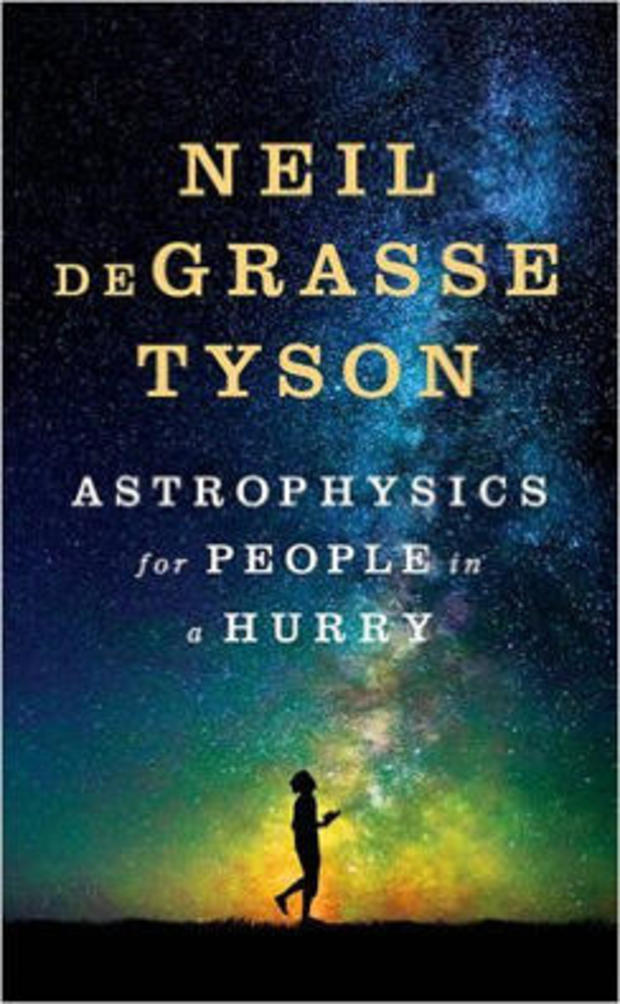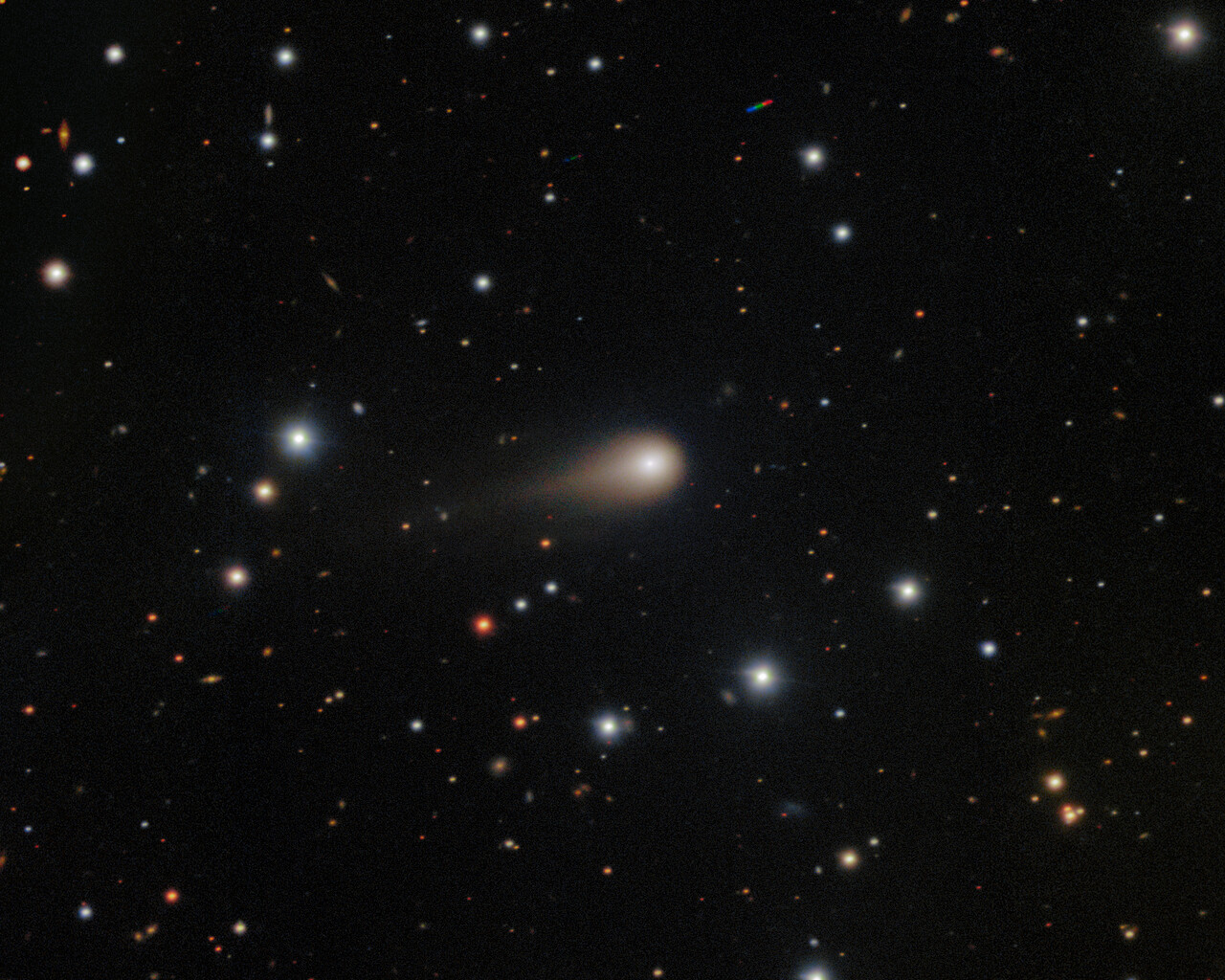Book excerpt: Neil deGrasse Tyson's "Astrophysics for People in a Hurry"
Time is relative, but some of us still don't have enough of it to fully take in the most salient aspects of such topics as dark matter, exoplanets, the Big Bang, and why so many objects in outer space are spherical.
Fortunately, we have Neil deGrasse Tyson, whose latest book, "Astrophysics for People in a Hurry" (published Tuesday from WW Norton), offers a shortcut to scientific literacy, with entertaining, bite-sized chapters that explore cosmic questions.
Read the excerpts below.
- Neil deGrasse Tyson, our joyful guide to the stars ("Sunday Morning," 04/30/17)
From: "Dark Energy"
So what is the stuff? Nobody knows. The closest anybody has come is to presume dark energy is a quantum effect -- where the vacuum of space, instead of being empty, actually seethes with particles and their antimatter counterparts. They pop in and out of existence in pairs, and don't last long enough to be measured. Their transient existence is captured in their moniker: virtual particles. The remarkable legacy of quantum mechanics -- the physics of the small -- demands that we give this idea serious attention. Each pair of virtual particles exerts a little bit of outward pressure as it ever so briefly elbows its way into space.
Unfortunately, when you estimate the amount of repulsive "vacuum pressure" that arises from the abbreviated lives of virtual particles, the result is more than 10120 times bigger than the experimentally determined value of the cosmological constant. This is a stupidly large factor -- a consequence of what may be the most embarrassing calculation ever made, leading to the biggest mismatch between theory and observation in the history of science.
Yes, we're clueless. But it's not abject cluelessness. Dark energy is not adrift, with nary a theory to call home. It inhabits one of the safest homes we can imagine: Einstein's equations of general relativity. Whatever dark energy turns out to be, we already know how to measure it and how to calculate its effects on the past, present, and future of the cosmos.
As a consequence, anything not gravitationally bound to the neighborhood of our Milky Way galaxy will recede at ever-increasing speed, as part of the accelerating expansion of the fabric of space-time. Distant galaxies now visible in the night sky will ultimately disappear beyond an unreachable horizon, receding from us faster than the speed of light. A feat allowed, not because they're moving through space at such speeds, but because the fabric of the universe itself carries them at such speeds. No law of physics prevents this.
In a trillion or so years, anyone alive in our own galaxy may know nothing of other galaxies. Our observable universe will merely comprise a system of nearby, long-lived stars within the Milky Way. And beyond this starry night will lie an endless void -- darkness the face of the deep.
Dark energy, a fundamental property of the cosmos, will, in the end, undermine the ability of future generations to comprehend the universe they've been dealt. Unless contemporary astrophysicists across the galaxy keep remarkable records and bury an awesome, trillion-year time capsule, future scientists will know nothing of galaxies -- the principal form of organization for matter in our cosmos -- and will thus be denied access to key pages from the cosmic drama that is our universe.
Behold my recurring nightmare: Are we, too, missing some basic pieces of the universe that once was? What part of the cosmic history book has been marked "access denied"? What remains absent from our theories and equations that ought to be there, leaving us groping for answers we may never find?
From: "Reflections on the Cosmic Perspectives"
The cosmic perspective is more than about what you know. It's also about having the wisdom and insight to apply that knowledge in assessing our place in the universe. And its attributes are clear:
The cosmic perspective comes from the frontiers of science, yet it is not solely the provenance of the scientist. It belongs to everyone.
The cosmic perspective is humble.
The cosmic perspective is spiritual -- even redemptive -- but not religious.
The cosmic perspective enables us to grasp, in the same thought, the large and the small.
The cosmic perspective opens our minds to extraordinary ideas but does not leave them so open that our brains spill out, making us susceptible to believing anything we're told.
The cosmic perspective opens our eyes to the universe, not as a benevolent cradle designed to nurture life but as a cold, lonely, hazardous place, forcing us to reassess the value of all humans to one another.
The cosmic perspective shows Earth to be a mote. But it's a precious mote and, for the moment, it's the only home we have.
The cosmic perspective finds beauty in the images of planets, moons, stars, and nebulae, but also celebrates the laws of physics that shape them.
The cosmic perspective enables us to see beyond our circumstances, allowing us to transcend the primal search for food, shelter, and sex.
The cosmic perspective not only embraces our genetic kinship with all life on Earth but also values our chemical kinship with any yet-to-be discovered life in the universe, as well as our atomic kinship with the universe itself.
At least once a week, if not once a day, we might each ponder what cosmic truths lie undiscovered before us, perhaps awaiting the arrival of a clever thinker, an ingenious experiment, or an innovative space mission to reveal them. We might further ponder how those discoveries may one day transform life on Earth.
Absent such curiosity, we are no different from the provincial farmer who expresses no need to venture beyond the county line, because his forty acres meet all his needs. Yet if all our predecessors had felt that way, the farmer would instead be a cave dweller, chasing down his dinner with a stick and a rock.
During our brief stay on planet Earth, we owe ourselves and our descendants the opportunity to explore -- in part because it's fun to do. But there's a far nobler reason. The day our knowledge of the cosmos ceases to expand, we risk regressing to the childish view that the universe figuratively and literally revolves around us. In that bleak world, arms-bearing, resource-hungry people and nations would be prone to act on their low contracted prejudices. And that would be the last gasp of human enlightenment -- until the rise of a visionary new culture that could once again embrace, rather than fear, the cosmic perspective.
From "Astrophysics for People in a Hurry" by Neil deGrasse Tyson, published by W.W. Norton & Company. Copyright (c) 2017 by Neil deGrasse Tyson. All rights reserved.
For more info:
- "Astrophysics for People in a Hurry" by Neil deGrasse Tyson (WW Norton)
- Neil deGrasse Tyson (Official site)
- "Star Talk" Radio
- "Star Talk" (National Geographic Channel)





